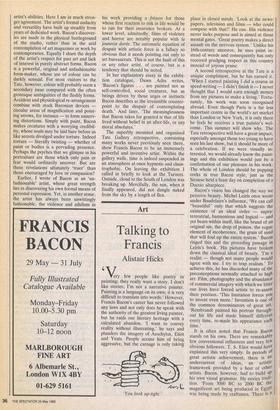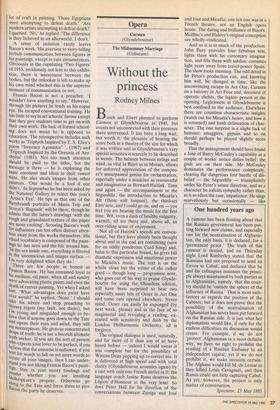Art
Talking to Francis
Alistair Hicks
Very few people like poetry or painting; they really want a story. I don't like stories; I'm not a narrative painter. Painting is a language on its own; it is very difficult to translate into words.' However, Francis Bacon's career has never followed any laws and not only does he speak with the authority of the greatest living painter, but he raids our literary heritage with a calculated abandon. 'I want to convey reality without illustrating,' he says and plunders the imagery of Aeschylus, Eliot and Yeats. People accuse him of being aggressive, but the carnage is only taking
'You look up-tight.' place in closed minds. 'Look at the news- papers, television and films — who could compete with that?' He can. His violence never lacks purpose and is aimed at those mental gates. 'Great poetry makes a direct assault on the nervous system.' Unlike his 16th-century ancestor, he uses paint in- stead of words and consequently has only received grudging respect in this country instead of joyous praise.
A second retrospective at the Tate is a unique compliment, but he has earned it. 'When I started painting I did a course in speed-writing — I didn't finish it — I never thought that I would earn enough money from my pictures to make a living.' Fortu- nately, his work was soon recognised abroad. Even though Paris is a far less important centre in the world's art market than London or New York, it is only there he feels he receives a true painter's wel- come. This summer will show why. The Tate retrospective will have a great impact, especially amongst those too young to have seen his last show, but it should be more of a celebration. If we were visually in- terested, we would already know the paint- ings and this exhibition would just be a confirmation of our pleasure in his work. The whole of London should be popping corks in true Bacon style, just as the Sienese held a feast day on completion of a Duccio altarpiece.
Bacon's vision has changed the way we perceive beauty. Michel Leiris once wrote under Baudelaire's influence, 'We can call "beautiful" only that which suggests the existence of an ideal order — supra- terrestrial, harmonious and logical — and yet bears within itself, like the brand of an original sin, the drop of poison, the rogue element of incoherence, the grain of sand that will foul up the entire system.' Bacon ringed this and the preceding passage in Leiris's book. His pictures have broken down the classical ideal of beauty. 'I'm a realist — though not many people would agree with me. I try to trap realism.' To achieve this, he has discarded many of the preconceptions normally attached to high art. Film, photography and the abundance of commercial imagery with which we litter our lives have forced artists to re-assess their position. 'This limitation forces you to invent even more.' Invention is one of the common denominators of great art. 'Rembrandt painted his portrait through- out his life and made himself different every time, re-made his appearance each time.'
It is often noted that Francis Bacon stands on his own. There are remarkably few conventional influences and very few obvious followers. T. S. Eliot would have explained this very simply. In periods of great artistic achievement, there is an undercurrent of ideas, an artistic framework provided by a host of other artists. Bacon, however, had to build up his own visual grammar. He envies tradi- tion. 'From 3000 BC to 2000 BC the magnificent art being produced in EgYPt was being made by craftsmen. There is a lot of craft in painting. Those Egyptians were attempting to defeat death.' Are modern artists attempting to defeat death?' I queried. 'No,' he replied. 'The difference is they believed in an afterworld. I don't.'
A sense of isolation rarely leaves Bacon's work. His aversion to story-telling forbids communication between figures in his paintings, except in rare circumstances. Obviously in the copulating 'Two Figures' of 1953, invidiously not lent to this exhibi- tion, there is intercourse between the bodies, but the onlooker is left to make up his own mind whether this is the supreme moment of communication or not.
Francis Bacon is not a preacher. 'I wouldn't have anything to say.' However, through his pictures he lends us his rogue eye. He escaped conventional training. He has little to say in art schools' favour except that they give students time to get on with their own work. His lack of formal school- ing does not mean he is opposed to education. The retrospective includes such works as 'Triptych Inspired by T. S. Eliot's Poem "Sweeney Agonistes" ', (1967) and `Triptych Inspired by the Oresteia of Aes- chylus' (1981). Not too much attention should be paid to the titles, but the message is there — he is exploiting the same emotions and ideas in their rawest state. He also steals images from other Painters. 'One would be a fool if one didn't.' In September he has been asked by the National Gallery to select this year's `Artist's Eye'. He tips us that one of the Rembrandt portraits of Maria Trip and Seurat's `Bagnade' will be there, though he admits that the latter's drawings 'with the tough and granulated texture of the paper are more exciting'. Scouring Bacon's work for influences can too often distract atten- tion away from the works themselves. His visual vocabulary is composed of the paint- ings he has seen and the life around him.
In the sea inside one, everything is filtered in the unconscious and images surface I in very delighted when they do.' There are few people as honest as Francis Bacon. He has remained loyal to his medium, oil paint, when all and sundry Were advocating plastic paints and even the death of canvas painting. Yet when I asked him, 'What advantages does paint have Over words?' he replied. 'None.' I should rake his advice and stop preaching to literary bigots (my fault, not theirs), but in young and misguided enough to be- lieve that if anyone goes down to the Tate and opens their eyes and mind, they will see masterpieces. He gives us concentrated drops of truth; he is not a boorish ultimate truth seeker. If you are the sort of person who expects your lover to be perfect, if you believe that the universe is unflawed, if you wait for worcls to fall on yet more words to create all your images, then I can under- stand you not liking Francis Bacon's paint- "n8s. Stay in your musty bindings and Ponder whether you are insulting Shakespeare's progeny. Otherwise go `,;Iclog to the Tate and force them to give 'aeon the party he deserves.



















































 Previous page
Previous page